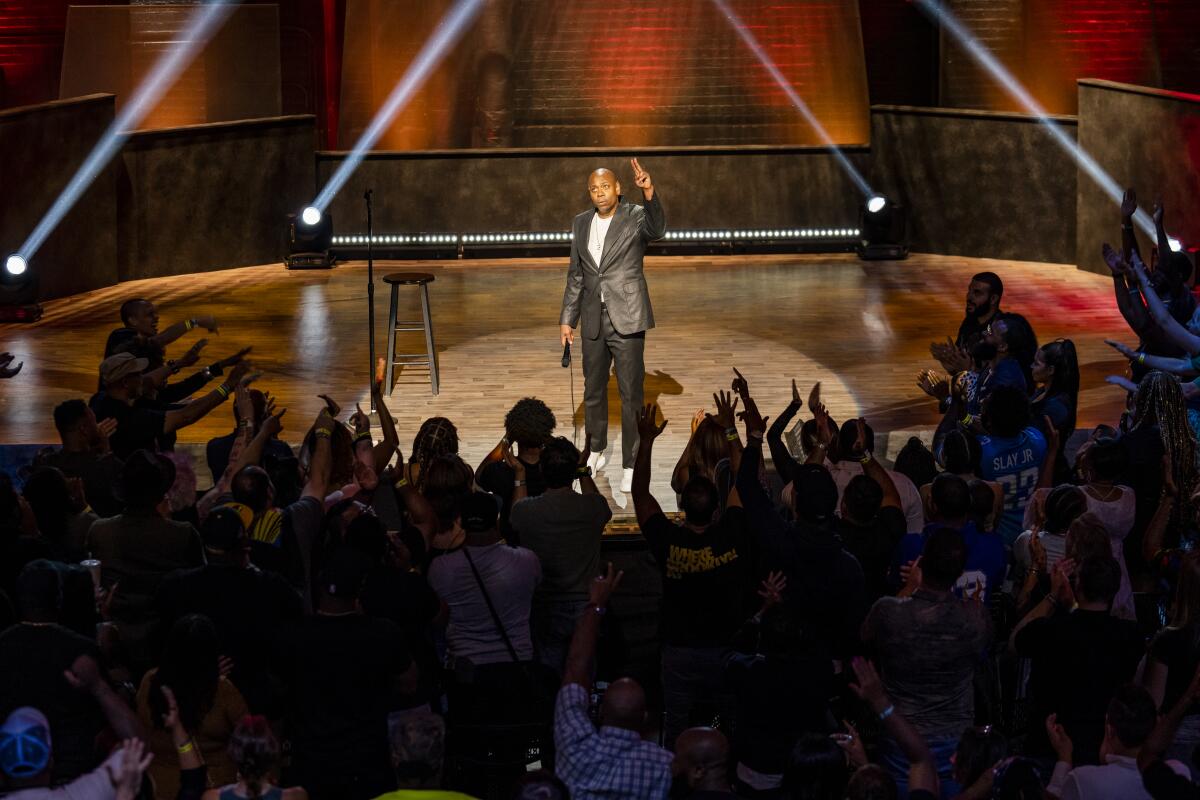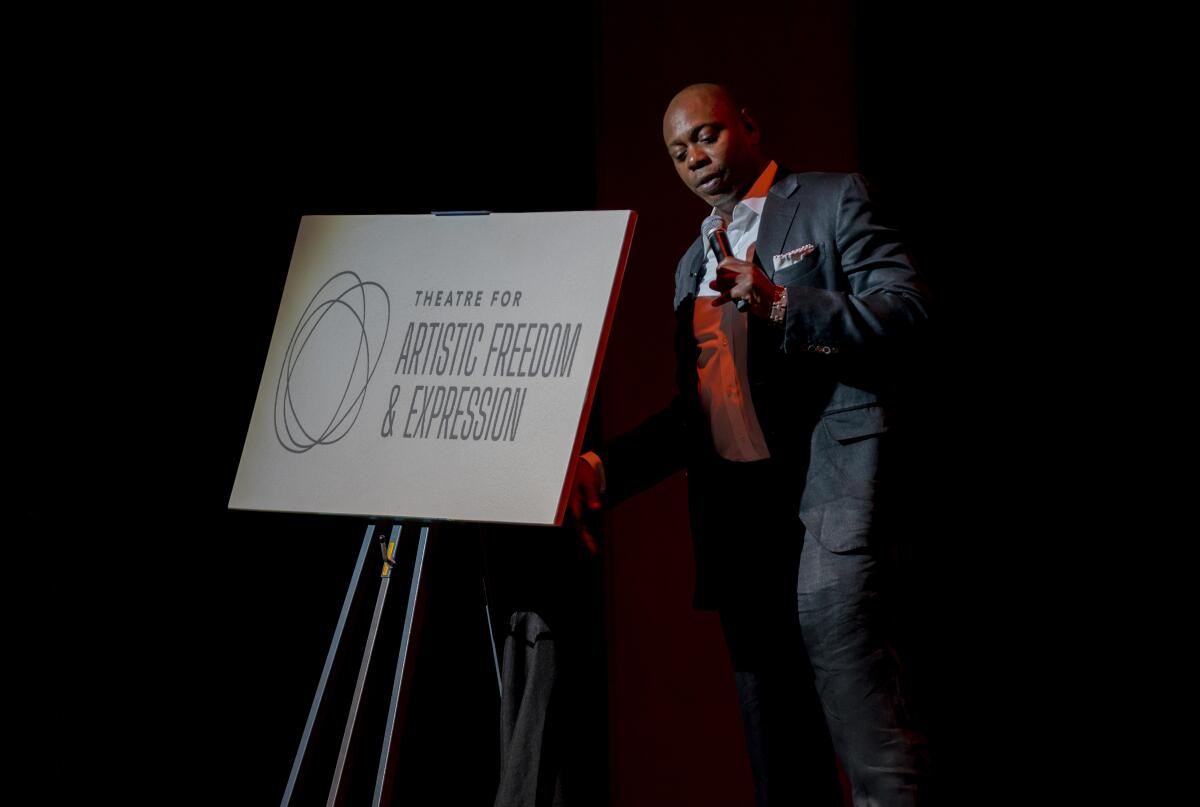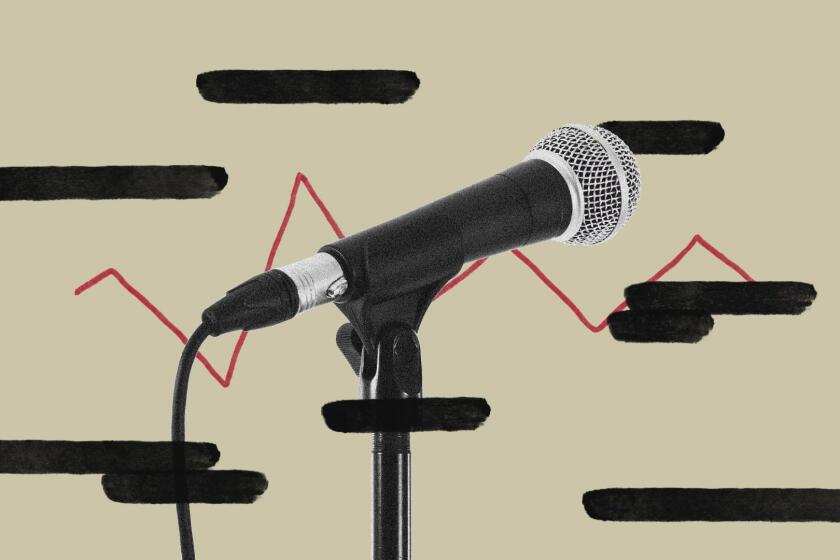The uncancelable comedy of Dave Chappelle
Ross May / Los Angeles Times; photo by Mathieu Bitton / Netflix
- Share via
Comedy has always been accompanied by some element of danger. Whether it be the threat of arrest on obscenity charges that comics faced up until the late 20th century or today’s risk of being “canceled,” comedians have always had to tread carefully while evoking taboos in their jokes.
“Comedy will always have its perils,” said former stand-up comic and comedy historian Kliph Nesteroff, author of “The Comedians: Drunks, Thieves, Scoundrels and the History of American Comedy.” “But it was far greater in the old days when the law could threaten you with arrest or the mob could kill you. The big difference today is that the threat of arrest doesn’t exist.”
While they may no longer run the risk of jail time, today’s comedians face the threat of scandal depending on who and how many people they offend. When social media outrage — typically referred to as “cancel culture” — is easy to spark, jokes told onstage can spur calls for consequences similar to those for celebrities accused of a crime.
And there is no defined metric for what it takes to attract the ire of cancel culture. Consider the case of Dave Chappelle, who was accused of transphobia after making jokes about the transgender and greater LGBTQ community and experience in his 2021 Netflix special, “The Closer.”
“Dave Chappelle is a good example because here’s somebody who upset people based on things he said onstage, not things he did offstage,” said Nesteroff. “It’s different than somebody like Chris Hardwick and T.J. Miller [who] got in trouble for things they’re accused of doing offstage. Neither of them have had a career really return to what it was prior to their scandal. That’s why I don’t like the phrase ‘cancel culture,’ it’s just a broad generalization that refers to nothing.”
Shortly after the release of “The Closer,” transgender Netflix employees staged a walkout in protest. A Minneapolis venue canceled a sold-out Chappelle show hours before he was scheduled to perform. Mainstream media coverage swarmed the controversy and labeled his comedy as transphobic.
Because of his status as an A-list comedian, Chappelle’s critics have viewed his targeting of trans people in jokes as permission to target trans people in real life. Throughout the country, trans people remain a target for physical violence, including killings, and face widespread discrimination outside the U.S.’ biggest cities. The culture shifted in the post-George Floyd reckoning; the expectation among many is that if you are silent (let alone pile on to the hate), you are part of the problem. And LGBTQ advocacy groups GLAAD and the National Black Justice Coalition, along with a smattering of (mostly queer or trans-identifying) celebrities, publicly condemned the special and called on Netflix to remove it.
However, their efforts were ultimately fruitless. Not only is “The Closer” still available on Netflix, but it was the platform’s most-watched comedy special of all time and was nominated for two Emmy Awards. “If 100 people watch Dave Chappelle’s last special, three people might not like it and the media gives all the attention to that 3%,” said comic Donnell Rawlings. “[With] Dave Chappelle, they tried to cancel him [but] I didn’t see his attendance slow down.”
Readers respond to our coverage of the debate over Dave Chappelle’s Netflix special plus the climate change message of the opera “Sun & Sea.”
And Chappelle’s career shows no signs of a slowdown anytime soon: This year, Netflix released another of the comic’s specials, “What’s in a Name?,” and he was invited to host the post-midterm election episode of “Saturday Night Live” (He found himself back in hot — or at least tepid — water after his monologue was criticized for going too easy on Kanye West’s antisemitic comments). He has also gone on to perform multiple sold-out stand-up shows (including the infamous Hollywood Bowl show where he was tackled onstage) and is co-headlining a West Coast stand-up tour with Chris Rock this month.
During Sunday’s tour stop in San Francisco, Chappelle made headlines again after he welcomed tech billionaire Elon Musk onstage at the Chase Center. “Make some noise for the richest man in the world,” the comedian said; the crowd answered by booing Musk for nearly five minutes straight.
“It sounds like some of the people you fired are in the audience,” Chappelle joked — in reference to the Twitter employees Musk laid off in November after purchasing the social media platform. Even in a stadium full of jeers, the comedian was able to make the crowd’s audible rage break long enough to turn the tide to laughter.
How has Chappelle’s career managed to thrive in the wake of the controversy? It’s a good question, especially when online outrage can have especially damaging consequences for prominent Black celebrities. “Cancel culture goes hard [against] African Americans,” Rawlings said. “There is no forgiveness, and that’s even with your apology. [It’s like] ‘Say sorry.’ ‘Sorry.’ ‘OK, we still don’t accept you.’ Before you cancel [a person], can you sit down and explain why you’re upset and how we can move forward? There’s none of that. It’s just, ‘We’re going to get him.’”
Controversy can often become weaponized by racists who exploit the opportunity to pile on Black artists, Nesteroff said. “It’s mostly pushed by people who are not involved in comedy, who don’t care about comedy, who’re not funny. When did Tucker Carlson become an expert on comedy? Why now?”
There’s a difference between what people say onstage and what people do offstage. We’ve lumped them all together as if they’re the same, but they’re two different considerations.
— Comedy historian Kliph Nesteroff on “cancel culture”
The fact that Chappelle’s controversial remarks happened onstage may have provided some insulation. “There’s a difference between what people say onstage and what people do offstage,” said Nesteroff. “We’ve lumped them all together as if they’re the same, but they’re two different considerations. [That’s why] I don’t use the phrase ‘cancel culture.’ Is it in reference to protesting bigotry? Is it in relation to somebody getting charged with a crime like rape? When you combine everything, then you can use it as a powerful political example of how the world has gone awry. But they really all need to be addressed on a case-by-case basis.”
The comic’s legendary artistic status and built-in, unshakable fan base have also helped ensure his staying power. During the height of the controversy, Chappelle’s support among many in the Black community never wavered, as evidenced by responses on Black media platforms, gossip sites like the Shade Room and social media. “Especially with stand-up, if you have a loyal fan base, it’s hard for anyone to stop you from putting your name on a marquee,” said Rawlings. “Your true fans will come out to see you. It’s always a small percentage [of people] that get more shine than the people that really love you.”

This is hardly Chappelle’s first brush with the threat of career termination. After he famously walked away from his groundbreaking Comedy Central sketch comedy series “Chappelle’s Show” (and the network’s $50-million offer for a third season) in 2006, the comedian was essentially blacklisted from Hollywood before he decamped to South Africa, stepping away from the limelight for nearly a decade.
“If you quit a show like ‘Chappelle’s Show,’ I don’t know if you know what happens to you professionally, but I’ll tell you what doesn’t happen: They don’t just say, ‘Well, good luck in your future endeavors,’” he said in his 2022 Netflix special “What’s in a Name?” “With that media, they beat me up. With their power, they tried to make me behave. It takes a strong person to stand out in the cold like that.”
“You don’t have too many people that have had a Muhammad Ali moment in their life,” said Rawlings. “Where you had to stand on something, question your morals, your beliefs, knowing the chance of losing money [and] what the flak would be and you still do it.”
“He has shown previously in his work, in his life, that there is no amount of money that will make him [compromise his beliefs],” agreed comedian Earthquake. “He’s self-sufficient in who he is and he knows he’s [none of] the things that [people are] saying or trying to project that he is.”
Amid “The Closer” controversy, Chappelle’s alma mater, Washington, D.C.’s Duke Ellington School of the Arts, resolved to name its newly renovated theater Dave Chappelle Theatre. In his 40-minute acceptance speech, chronicled in “What’s in a Name?,” Chappelle responded to the controversy and defended his right to free speech.
You cannot report on an artist’s work and remove artistic nuance from his words. It would be like if you were reading a newspaper and they say, ‘Man Shot in the Face by a Six-Foot Rabbit Expected to Survive’ and they never tell you it’s a Bugs Bunny cartoon.
— Dave Chappelle in his 2022 Netflix comedy special “What’s in a Name?”
“Art is a powerful commodity,” he said. “An artist, if you’re good at it, should never behave as a commodity. ... My biggest gripe with this whole controversy with ‘The Closer’ [is] that you cannot report on an artist’s work and remove artistic nuance from his words. It would be like if you were reading a newspaper and they say, ‘Man Shot in the Face by a Six-Foot Rabbit Expected to Survive’ and they never tell you it’s a Bugs Bunny cartoon.
“The more you say I can’t say something, the more urgent it is for me to say it,” he added. “And it has nothing to do with what you’re saying I can’t say. It has everything to do with my right, my freedom of artistic expression that is valuable to me, that is not separate from me. It’s worth protecting for me and it’s worth protecting for everyone else who endeavors in our noble profession.”
“I think that there’s too much power [in cancel culture],” said Rawlings. “You say anything, ‘Oh, you’re gonna be canceled.’ Is it fair for one joke that rubs you the wrong way to just destroy or [ruin a career] in comedy? It’s not. And that’s why I think Dave Chappelle’s stance on comedy is such a good thing for the business because it lets you know some people will stand on what they believe for the sake of art.
“I’m really happy that there are [corporations] like Netflix that get behind Dave Chappelle,” he added. “Not saying they totally agree with everything he said, but they understand this is art and we have to protect art. And freedom of speech, we have to protect that. That was a tough thing for them to do, but they did it and it slightly empowered the comedy community because it was like ‘OK, they do understand what we’re trying to do.’”
Three L.A. comics discuss whether Chappelle’s jokes were punching down or just needed some punching up.
In “What’s in a Name?” Chappelle recalled his feelings at being met by student protests upon his return to his alma mater following “The Closer.”
“These kids said everything about gender and this and that and the other, but they didn’t say anything about art ... and these kids didn’t understand that they were instruments of oppression,” he said. “I took a lot of cold shots in show business. And I gotta tell you, as the years go on, you feel the shots less and less. ‘Ah, it’s just the business,’ is what you say. But ... when I heard those talking points coming out of those children’s faces, that really, sincerely hurt me. Because I know those kids didn’t come up with those words, I’ve heard those words before.”
Nesteroff posits that the protests against Chappelle are not entirely fueled by the LGBTQ community but largely by right-wing racists hoping to capitalize on the controversy.
“I think he’s specifically been exploited by culture war talking heads who want to use him as an example,” he said. “There are evangelicals who have contempt for transgender and gay people and they’ll use Dave Chappelle — somebody that they would traditionally have had contempt for himself — as an example to prove that his detractors are irrational and should be derided and marginalized. They see it as a way to splinter their political adversaries and in doing so, figuring out a way to consolidate political power for themselves.”

Another factor in Chappelle’s longevity? Nesteroff suggests that today, Chappelle’s celebrity has largely overshadowed his comedy, making any live gig he does less of a comedy show and more of an event. “There’s no way that Dave Chappelle is going to go up and bomb,” he said. “The audience is enamored by the star power and will hang on every word. It’s like a stadium concert: Some of these shows are just full of celebrities. And not all are comedians, some are musicians and some of those shows go as long as four or five hours. So in a way, it’s beyond comedy. It’s more like Coachella than a stand-up show at a comedy club.”
In one such viral moment, Chappelle opened for Kevin Hart and Chris Rock’s Madison Square Garden show in late July. It came on the heels of another highly publicized moment in cancel culture history, following Rock’s assault by Will Smith onstage at the Academy Awards, which led to calls to cancel Smith and, for better or worse, incited crowds to turn up for Rock’s Ego Death tour.
“Tonight, being with these guys, means the world to me,” said Chappelle onstage at MSG. “They try to cancel people, but you have to understand something: I’ve been doing this for 35 years. Comedians, we go to their birthday parties, we go to their weddings, we go to their baby showers. We go to each other’s funerals.
“This cancel culture, I get it. I want justice too. But my man, these men and women that do stand-up comedy have a culture. It’d be very hard for you to understand [that] each and every one of you, no matter what you believe, has a champion in our room and we would never silence each other. And when my brothers call me, I come running.”
Comedy historian Kliph Nesteroff and comics Donnell Rawlings and Tiffany Haddish explain the origins of modern-day cancel culture and its historical equivalents.
More to Read
The biggest entertainment stories
Get our big stories about Hollywood, film, television, music, arts, culture and more right in your inbox as soon as they publish.
You may occasionally receive promotional content from the Los Angeles Times.












